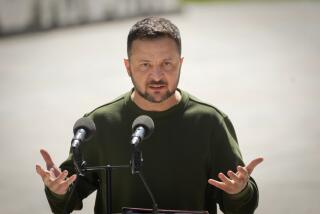Pole Claims He Was Recruited to Kill Walesa
- Share via
WARSAW — Polish authorities said Tuesday that they have arrested a 34-year-old convicted killer who claims he was recruited by an agent of an unidentified group to assassinate Lech Walesa, leader of the outlawed Solidarity union movement.
Jozef H. Szczepanski, described as a welder with a sixth-grade education and a long criminal record, was arrested May 9 after he went to Walesa’s apartment in Gdansk and told the Solidarity leader of the plot, then signed a statement for police, government spokesman Jerzy Urban said.
Szczepanski was serving an 11-year sentence for homicide but had been released temporarily last October on a six-month leave to tend to his ailing wife, Urban said.
He said Szczepanski is now being held on new charges of conspiracy to commit a crime, an offense that carries a maximum sentence of five years in prison. The spokesman elaborated on an official account of the arrest that appeared in a Gdansk newspaper.
Caution Urged
Speaking at his regular weekly news conference, Urban cautioned Western journalists to treat the matter “with reserve,” since there is no corroborating information and police have not ruled out the possibility that the suspect fabricated his story.
The official account of Szczepanski’s story immediately aroused speculation that elements of the nation’s security apparatus had sought to eliminate Walesa as they did Father Jerzy Popieluszko, the pro-Solidarity Roman Catholic priest killed by three secret police officers last October. The three officers and their immediate superior in the Polish security service were sentenced last February to terms ranging from 14 to 25 years in prison.
According to the government account, Szczepanski appeared at Walesa’s apartment May 6 and said a mysterious and persuasive stranger had met him several times during furloughs from prison to persuade him to carry out a “task” that was finally revealed to be the murder of Walesa.
Szczepanski reportedly said he refused and fled to Walesa in fear of his own life. The Solidarity leader urged him to put his story in writing. When he returned three days later, on May 9, with the statement in hand, he and Walesa, accompanied by aides, took it to police. Urban said the suspect repeated his allegations in a taped interview with police, in Walesa’s presence, and signed his statement.
Urban said Szczepanski was from the village of Koscielna Jania in the Baltic coast region near Gdansk. He quoted the man’s mother as saying that her son left school after the sixth grade and suffered from a speech defect and learning difficulties that developed after he was kicked by a horse.
Szczepanski’s record shows numerous convictions as a juvenile and young adult for theft and other offenses. Most recently, he was convicted of killing a man in a brawl. There are unconfirmed reports that the victim was a policeman.
According to Szczepanski, unidentified conspirators first made contact with him in a letter dated June 26, 1983, that was sent to him in Rawicz prison near Poznan. He said the anonymous letter promised to help him go abroad if first he would apply for leave from prison, then carry out an unspecified “task.”
Station Meetings
Szczepanski did obtain two brief furloughs from prison and on at least three occasions met his mysterious contact at the Rawicz railroad station, he said in his written statement. The man, whom he described as about six feet tall, with dark curly hair and a persuasive manner, allegedly urged him to apply for a longer leave but refused to describe the task.
Prison authorities, noting the serious illness of Szczepanski’s wife, released him on Oct. 16 for a six-month leave that expired April 16, Urban said.
According to Szczepanski’s tale, his contact then urged him in meetings early this year to simulate a suicide attempt--which he did--to convince prison officials of his despondency over his wife’s condition and to bolster his case for clemency.
The man, who Szczepanski said always seemed to know where to find him, met him upon his release from a psychiatric hospital in the Gdansk area April 26 and told him for the first time that his mission was to assassinate Walesa as a “traitor to the nation.”
The government spokesman quoted Szczepanski as claiming that he was to be provided with a white Fiat and driver, an American pistol, a passport, visa and thousands of U.S. dollars, along with instructions on what to say if caught. In response to questions, Urban said he did not mean to imply American involvement in the alleged plot.
Szczepanski said in his statement that when he refused to kill Walesa, the man reacted with fury, telling him to remain silent if he wanted to live.
Urban said a psychiatric evaluation of Szczepanski after his simulated suicide attempt indicated depression and encephalopathy, a broad term denoting brain dysfunction or brain disease.
More to Read
Sign up for Essential California
The most important California stories and recommendations in your inbox every morning.
You may occasionally receive promotional content from the Los Angeles Times.










